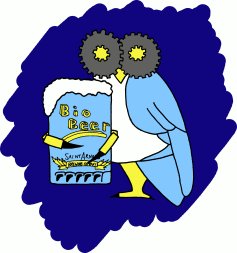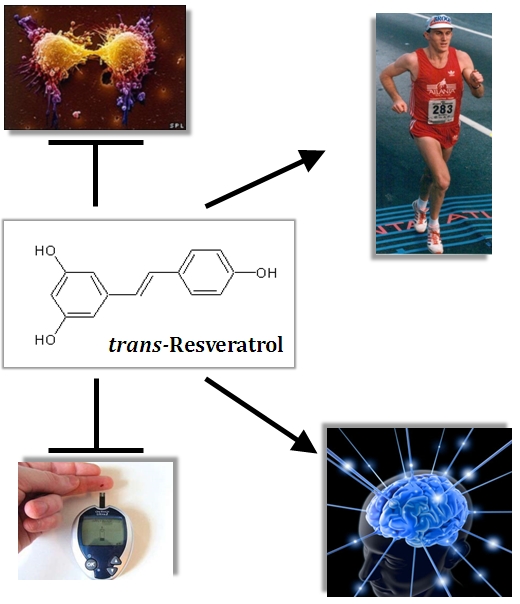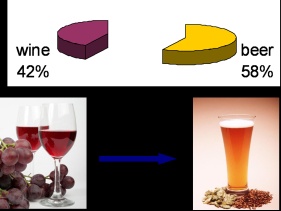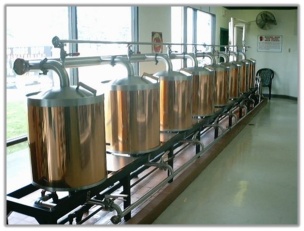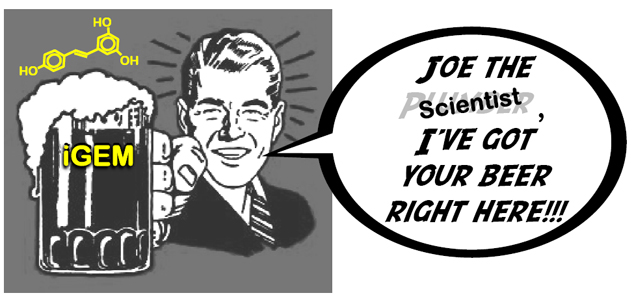Team:Rice University
From 2008.igem.org
DavidOuyang (Talk | contribs) (→Health Benefits) |
DavidOuyang (Talk | contribs) (→Health Benefits) |
||
| Line 29: | Line 29: | ||
[[Image:winetobeer.jpg|right]] | [[Image:winetobeer.jpg|right]] | ||
| + | <BR><BR><BR><BR><BR><BR> | ||
<BR><BR><BR><BR><BR><BR> | <BR><BR><BR><BR><BR><BR> | ||
[[Image:brewing.jpg|left]] | [[Image:brewing.jpg|left]] | ||
Revision as of 21:07, 27 October 2008
Contents |
Welcome to Rice University's 2008 iGEM wiki page.
Our project for this year is BIOBEER, where we are genetically engineering the biosynthetic pathway for resveratrol production into a brewing yeast strain. Resveratrol has been shown to have a plethora of health benefits, including anti-cancer and anti-viral activity, cardio- and neuro-protective effects, modulation of diabetes, and anti-aging effects. Although research has been done previously to produce resveratrol in various organisms, no one to date has developed a yeast strain able to synthesize resveratrol in a de novo manner. We are going one step further, characterizing resveratrol production during anaerobic fermentation with the intent of creating a beer that contains all the health benefits of wine. Get ready for resveratrol in a fizzy ready-to-consume beverage!
BioBeer: Producing Resveratrol During Beer Fermentation
Resveratrol
- First identified as the active component in C. quinquangulata (cinnamon) extract responsible for anti-inflammatory properties.
- Normally used as a defense mechanism in plants in response to fungal pathogens and UV irradiation.
- Main source in human diet is red wine, but significant amounts are also found in grape juice, peanuts, cranberry juice, and other sources.
- There is a tremendous interest in the potential of resveratrol for various health benefits. A PubMed search for 'resveratrol' returns 2,470 scientific articles.
- First identified as the active component in C. quinquangulata (cinnamon) extract responsible for anti-inflammatory properties.
Health Benefits
- Improved cardiovascular function
- Increased insulin sensitivity
- Maintenance of neural pathways
- Inhibition of carcinogenesis
Why resveratrol in beer?
-Beer made up 85.8% of all alcoholic beverage consumption (in total volume) in 2005.
-->Annual per capita consumption of Beer (2005) = ~20 gallons
-->Annual per capita consumption of Wine (2005) = ~2.5 gallons
-If resveratrol can be produced during fermentation, it provides an additional health benefit at no additional cost.
-->The resveratrol is produced in a ready-to-consume format!
-->Dark and anaerobic conditions required for fermentation improve resveratrol stability.
The Rice 2008 Synthetic BiOWLogists
| Home | The Team | The Project | Parts Submitted to the Registry | Notebook |
|---|
 "
"


